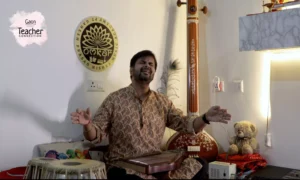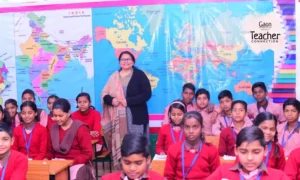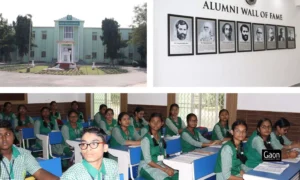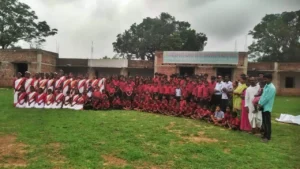When Mamata Singh was jailed for four months, she never believed that after getting out, she could find any employment. But after her release from the jail, ever since she started making Lakshmi-Ganesha idols using old newspapers for Diwali, she found a source of livelihood never looked back.
About 205 kilometres away from the Uttar Pradesh capital Lucknow, in Basti jail, there are many prisoners like Singh who have been turned into skilled individuals by a primary teacher named Alok Shukla.
Shukla is an art and craft teacher at the Kavalsia-Gaur Upper Primary School in the Basti district. Apart from teaching jailed women inmates, he has also taught women in the district’s self-help groups [SHGs] to make decorative pieces from waste material. It has helped them find a source of livelihood.
“For the past several years, I have been teaching women in the jail to make rakhi, Holi colours, and idols of gods and goddesses from old newspapers. In 2021, Mamata Singh was also in jail and she learned to make idols along with other women. After coming out from here, she made idols for Diwali and continues to do some work. It helps her earn a respectable income,” Shukla told Gaon Connection.
“The first time when the female inmates joined me in making idols from newspapers, they were initially quite introverted and hopeless. They were unsure whether they could do it or not. But I reassured them that they can learn it,” he added.
So far, Shukla has trained 150 women prisoners and about 2,000 women in the villages. He has also presented Lakshmi-Ganesha idols made by these women to state Chief Minister Yogi Adityanath.
Also Read: From dropouts to achievers — a village school is bridging the education gap for tribal girls
Jatin Tomar, a constable posted at Basti jail told Gaon Connection, “When the women learned that a teacher was coming to teach them, they seemed quite excited. Women in the jail are always ready to learn something new. Most of them are not literate, but many people come to teach them something. However, no one has taught them with as much dedication as Alok”.

According to the National Crime Records Bureau’s report titled Crime in India, 2019, out of nearly 1,300 jails in the country, there are 31 women’s prisons where most of the inmates are under-trials.
Some states have introduced vocational training, separate rooms for children, and education for female prisoners, but there is still much to be done in most jails. In many prisons, incarcerated women are learning various creative skills ranging from sewing, knitting, embroidery, fashion jewellery, jute products, and making envelopes, to crafting items like candles, matchsticks, snacks, incense sticks, pickles, papad, paintings, herbal packs, artificial flowers, and pottery.
Meanwhile, going to the jail daily, passing through rigorous security checks before entering the women’s quarters, has now become a routine for Shukla.
Before entering the jail premises, he has to deposit his phone. “No matter how urgent the situation is or if any officer comes for a visit, they search me too. Items like needles and scissors shouldn’t be in their hands, but these things are used in such work. That’s why each female inmate has a constable with her, who keeps an eye on them,” Shukla said.
Also Read: A Visually Impaired Teacher Illuminated The Lives Of Children Of Tea-Garden Workers
Apart from teaching incarcerated women, Shukla is also training women from the SHGs outside the jail in the district.
Anita, a 35-year-old woman from Sahupar village in Basti district, has also learned to make natural colours (gulal).
Anita, who has been associated with the self-help group for three years, told Gaon Connection, “We didn’t have any work before, but since I joined the group, things have become easier. We had grown spinach, rose flowers, and beets in our field, and Alok sir taught the women of our group to make Holi colours from them”.
“We easily earn upto Rs 15,000 in a month. The profits are even better during the festive season,” she added.
At present, the women in the jails and the SHGs are busy making rakhis for the upcoming Rakshabandhan festival.


















